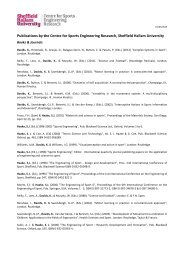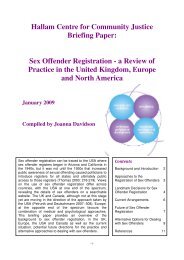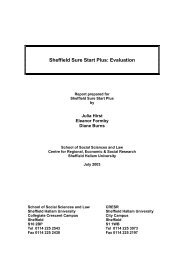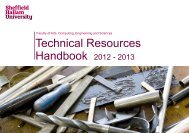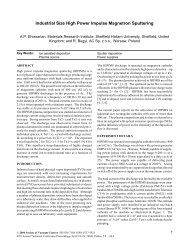The exercise of judicial discretion in rent arrears cases - Sheffield ...
The exercise of judicial discretion in rent arrears cases - Sheffield ...
The exercise of judicial discretion in rent arrears cases - Sheffield ...
Create successful ePaper yourself
Turn your PDF publications into a flip-book with our unique Google optimized e-Paper software.
Conclusions<br />
In this chapter, we have demonstrated that relationships <strong>of</strong> trust and confidence do exist<br />
between district judges and claimants. <strong>The</strong>se are not necessarily <strong>in</strong> opposition to <strong>judicial</strong><br />
neutrality – <strong>in</strong>deed, neutrality may coexist with such relationships. Our <strong>in</strong>terviewees were<br />
generally clear, for example, that there was no relationship between the request made by the<br />
claimant and the order granted. <strong>The</strong> judge would make the order they considered<br />
reasonable <strong>in</strong> the circumstances <strong>of</strong> the case. <strong>The</strong> observational data does suggest,<br />
however, the follow<strong>in</strong>g, which may have an impact on the outcome <strong>of</strong> <strong>cases</strong> and which may<br />
add to actual or perceptions <strong>of</strong> <strong>in</strong>consistency:<br />
<strong>The</strong>re may be a relationship between requests for certa<strong>in</strong> orders and the order<br />
granted by the judge. However, our data does not account for other relevant factors,<br />
such as level <strong>of</strong> <strong>arrears</strong>.<br />
This relationship appears stronger for certa<strong>in</strong> judges than others, although the<br />
numbers <strong>of</strong> <strong>cases</strong> observed per <strong>in</strong>dividual judge are too small to test this relationship<br />
further.<br />
This relationship appears to be stronger for local authority claimants than for hous<strong>in</strong>g<br />
association claimants. However, this may be because local authorities’ requests<br />
were made on the basis <strong>of</strong> higher levels <strong>of</strong> <strong>arrears</strong>.<br />
<strong>The</strong> relationship appears to be subject to geographical variation.<br />
Our <strong>in</strong>terview data also suggests that mistrust might have a negative impact on the<br />
relationship between request and outcome. Thus, the poor quality <strong>of</strong> certa<strong>in</strong> claimants<br />
(particularly hous<strong>in</strong>g associations), or where the claimant requested an order regarded by<br />
the district judge as particularly unreasonable, might mean that the requested order is not<br />
granted (at best).<br />
Whilst the relationship between trust and outcome is merely suggestive, the <strong>in</strong>terview data<br />
suggests that relationships <strong>of</strong> trust do impact on the process. This was particularly the case<br />
<strong>in</strong> the busier courts <strong>in</strong> our sample, where the district judges were scheduled to hear a case<br />
every few m<strong>in</strong>utes or so. <strong>The</strong> overarch<strong>in</strong>g theme beh<strong>in</strong>d this was personnel management by<br />
district judges <strong>of</strong> claimants’ representatives, and there was evidence <strong>of</strong> a reverse effect as<br />
well (that is, management <strong>of</strong> judges by claimants’ representatives). This was made possible<br />
by a number <strong>of</strong> factors which might comb<strong>in</strong>e together – the shift to hous<strong>in</strong>g <strong>of</strong>ficers<br />
appear<strong>in</strong>g on behalf <strong>of</strong> claimants; the ‘tra<strong>in</strong><strong>in</strong>g’ process <strong>in</strong> which district judges tend to<br />
engage claimant representatives and vice versa; those representatives' length <strong>of</strong> time <strong>in</strong><br />
54



